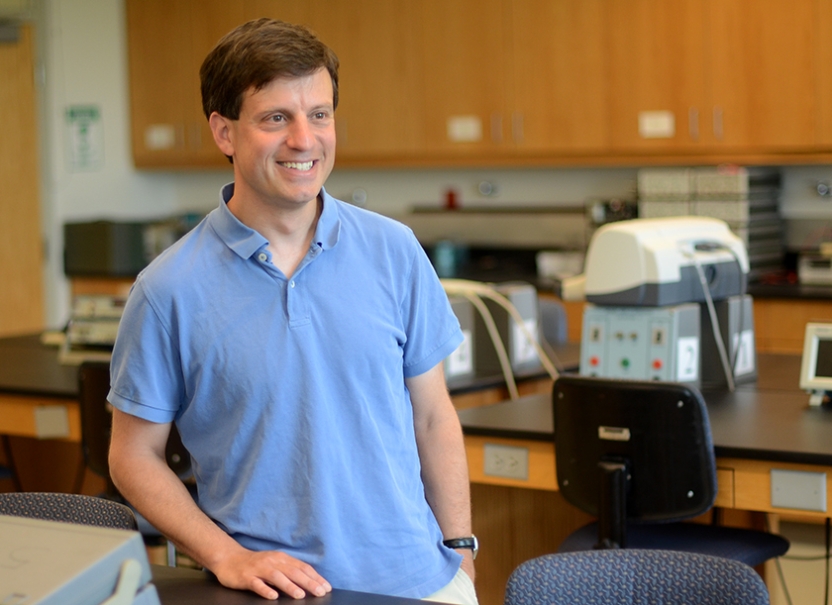Noah Graham Receives Perkins Award for Teaching

MIDDLEBURY, Vt. – Middlebury College has awarded the 2015 Perkins Award for Excellence in Teaching to Noah Graham, a professor of physics who is renowned among students in the sciences for how he incorporates questions into the flow of his classes.
According to a group of undergraduates who nominated him for the Perkins Award, Professor Graham can take a simple question and use it not only to clarify previous material, but to expand on the topic at hand.
“Most impressively,” wrote the students, “when the question is answered to his satisfaction, he connects the tangent directly to his next point in the lecture. He is an expert in his field” – applications of quantum mechanics, the physics of solitons and oscillons, and the Casimir effect – “and his ability to provide thorough answers to difficult questions is masterful as he truly deepens the entire class’s understanding of the material.”
Graham is well aware of how his students’ questions can shape his lectures and enhance the learning of others.
“I am a bit of an ad libber,” he explained, “so I come to class with a skeleton of the key equations and things that I really need to cover. That way I am always ready to go with the flow of the class because the best thing that can happen is having a student ask me a question in response to what I am teaching. That question is often what I was just about to say next anyway, or it was what I was going to say later, so now it becomes a great opportunity to work it into the class.”
The Perkins Award recipient uses an analogy from sports to make his point. A goalie never knows whether a shot is going to come from the left side or the right side, or high or low, but the player has to be ready for anything. Similarly, in his teaching Graham tries to “always be ready to respond based on what my students are thinking, and what makes it work the best is having students ask the questions because they are trying to get something straight, or make a connection to something they’ve learned before, or figure out something they never quite understood.”
“Those questions are what creates depth in my classes,” said Graham. “I never want my lectures to be a flat information dump. That’s never been good, and in this age of the Internet it is not only bad, it’s unnecessary too.”
What does Graham enjoy most about teaching? “It’s the combination of the interaction that I have with students both inside and outside of class and lab, and seeing how what I know about physics and mathematics resonates with them since students often think about things differently than I do.”
After earning his bachelor’s degree from Harvard summa cum laude in physics and mathematics, and before going on to MIT for a Ph.D. in theoretical physics, Graham worked in the software industry as a research scientist for a firm that developed the world’s first large-vocabulary speech recognition system.
Working at Dragon Systems Inc. “showed me that I could take something hard or seemingly impossible and break it apart, accept the challenge, and eventually step through it. It’s something that I do in my own research now, and it’s a process that I see my students experience too. It’s that perseverance, that getting stuck [on a problem] and then unstuck, and then stuck and unstuck again and again, that leads to discoveries.”
Following two years of postdoctoral research in theoretical elementary particle physics at UCLA, Graham joined the Middlebury faculty in 2002. He was promoted to associate professor with tenure in 2009 and attained the rank of full professor in 2014. When he is not teaching courses in electricity and magnetism, applied mathematics for the physical sciences, statistical mechanics, or quantum mechanics, he is doing his own National Science Foundation-funded research or serving as one of the three advisors to Middlebury’s STEM (science, technology, engineering, mathematics) Innovation Program.
The Perkins Award is provided by the Professor Llewellyn R. Perkins and Dr. Ruth M.H. Perkins Memorial Research Fund, and it was made possible by a gift from Ruth Perkins, Middlebury Class of 1932, in memory of her husband, Llewellyn, who taught at Middlebury from 1914 through 1941. Professor Perkins founded and chaired the mathematics department.
Their children, Marion Perkins Harris ’57, a science teacher, and David Perkins, a physician, augmented the fund and expanded the scope of the award to honor their mother, Ruth, as well as their father. The award supports the recipient’s faculty development. It is presented in even-numbered years to a member of the mathematics or computer science department, and in odd-numbered years to a faculty member who teaches in the natural sciences.
The Perkins Award was created in 1993. This year’s recipient, Noah Graham, said, “It is a great honor to be associated with all the fine professors who have won it before because I have learned so much about teaching from others. There are many schools of thought about teaching, but I have never aligned myself with just one approach. I have borrowed ideas from almost every teacher I have had.”
Reporting and photo by Robert Keren

